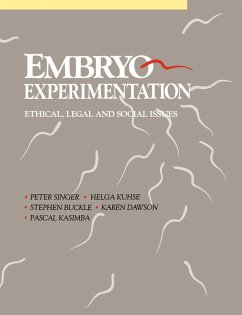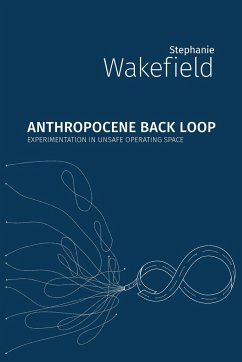Peter Singer / Helga Kuhse / Stephen Buckle / Karen Dawson / Pascal Kasimba (eds.)
Embryo Experimentation
Herausgeber: Buckle, Stephen; Singer, Peter; Kuhse, Helga
Peter Singer / Helga Kuhse / Stephen Buckle / Karen Dawson / Pascal Kasimba (eds.)
Embryo Experimentation
Herausgeber: Buckle, Stephen; Singer, Peter; Kuhse, Helga
- Broschiertes Buch
- Merkliste
- Auf die Merkliste
- Bewerten Bewerten
- Teilen
- Produkt teilen
- Produkterinnerung
- Produkterinnerung
New developments in reproductive technology have made headlines since the birth of the world's first in vitro fertilization baby in 1978. But is embryo experimentation ethically acceptable? What is the moral status of the early human embryo? And how should a democratic society deal with so controversial an issue, where conflicting views are based on differing religious and philosophical positions? These controversial questions are the subject of this book, which, as a current compendium of ideas and arguments on the subject, makes an original contribution of major importance to this debate.
Andere Kunden interessierten sich auch für
![The Morality of Embryo Use The Morality of Embryo Use]() Louis M. GueninThe Morality of Embryo Use85,99 €
Louis M. GueninThe Morality of Embryo Use85,99 €![The Morality of Embryo Use The Morality of Embryo Use]() Louis M. GueninThe Morality of Embryo Use35,99 €
Louis M. GueninThe Morality of Embryo Use35,99 €![Anthropocene Back Loop Anthropocene Back Loop]() Stephanie WakefieldAnthropocene Back Loop23,99 €
Stephanie WakefieldAnthropocene Back Loop23,99 €![Human Capacities and Moral Status Human Capacities and Moral Status]() Russell DiSilvestroHuman Capacities and Moral Status100,99 €
Russell DiSilvestroHuman Capacities and Moral Status100,99 €![Der moralische Status menschlicher Embryonen Der moralische Status menschlicher Embryonen]() Gregor Damschen / Dieter Schönecker (Hgg.)Der moralische Status menschlicher Embryonen109,95 €
Gregor Damschen / Dieter Schönecker (Hgg.)Der moralische Status menschlicher Embryonen109,95 €![The Ethics of Embryo Adoption and the Catholic Tradition The Ethics of Embryo Adoption and the Catholic Tradition]() The Ethics of Embryo Adoption and the Catholic Tradition116,99 €
The Ethics of Embryo Adoption and the Catholic Tradition116,99 €![Contingent Future Persons Contingent Future Persons]() Contingent Future Persons77,99 €
Contingent Future Persons77,99 €-
-
-
New developments in reproductive technology have made headlines since the birth of the world's first in vitro fertilization baby in 1978. But is embryo experimentation ethically acceptable? What is the moral status of the early human embryo? And how should a democratic society deal with so controversial an issue, where conflicting views are based on differing religious and philosophical positions? These controversial questions are the subject of this book, which, as a current compendium of ideas and arguments on the subject, makes an original contribution of major importance to this debate.
Hinweis: Dieser Artikel kann nur an eine deutsche Lieferadresse ausgeliefert werden.
Hinweis: Dieser Artikel kann nur an eine deutsche Lieferadresse ausgeliefert werden.
Produktdetails
- Produktdetails
- Verlag: Cambridge University Press
- Seitenzahl: 280
- Erscheinungstermin: 13. November 2003
- Englisch
- Abmessung: 246mm x 189mm x 16mm
- Gewicht: 547g
- ISBN-13: 9780521435888
- ISBN-10: 0521435889
- Artikelnr.: 21828336
- Herstellerkennzeichnung
- Libri GmbH
- Europaallee 1
- 36244 Bad Hersfeld
- gpsr@libri.de
- Verlag: Cambridge University Press
- Seitenzahl: 280
- Erscheinungstermin: 13. November 2003
- Englisch
- Abmessung: 246mm x 189mm x 16mm
- Gewicht: 547g
- ISBN-13: 9780521435888
- ISBN-10: 0521435889
- Artikelnr.: 21828336
- Herstellerkennzeichnung
- Libri GmbH
- Europaallee 1
- 36244 Bad Hersfeld
- gpsr@libri.de
Foreword J. D. McCaughey
1. Introduction Karen Dawson
Part I. The Scientific Issues: Introduction to this section Karen Dawson
Why do embryo research? Alan Trounson
Part II. The Moral Status of the Embryo The nature of ethical argument: an introduction Peter Singer and Helga Kuhse
(i) Arguments about the status of different developmental stages Fertilization and moral status Karen Dawson
Segmentation and moral status Karen Dawson
When does a new individual begin, and what does it matter, morally? Helga Kuhse
What makes a being morally significant? Peter Singer and Helga Kuhse
(ii) Arguments about potential IVF Technology and the argument from potential Peter Singer and Helga Kuhse
Arguing from potential Stephen Buckle
Part III. Controlling Embryo Experimentation in a Democratic Society (i) Legislation or self-regulation
The case for self-regulation John Funder
Community control of IVF and embryo experimentation Max Charlesworth
Self-regulation and embryo experimentation in Australia - a critique Pascal Kasimba
(ii) Forming a public policy Public policy in a pluralist society R. M. Hare
Is IVF research a threat to women's autonomy M. A. Warren
IVF regulation: the search for a legal basis Pascal Kasimba
How scientists view regulation: an interview with Drs Alan Trounson and Ismail Kola Karen Dawson
(iii) Drawing lines. Biological processes and moral events Stephen Buckle
The distinction between therapeutic and non-therapeutic experimentation Elizabeth Gaze and Karen Dawson
The syngamy debate: when does an embryo begin? Stephen Buckle, Karen Dawson and Peter Singer
Part IV. The First Legislation: An examination of Victoria's law
The Waller committee and the origins of the Victorian legistation Elizabeth Gaze
Experiments on embryos: permissions and prohibitions under the Infertility (Medical Procedures) Act, 1984 Pascal Kasimba
Legislation and the problems of research Karen Dawson
When is cloning lawful? Pascal Kasimba and Margaret Brumby
An interview with Louis Waller Elizabeth Gaze
Conclusion
Afterword J. M. Swan
Glossary Karen Dawson
Appendices: Infertility (Medical Procedures) Act, 1984 National Health and Medical Research Council guidelines on embryo experimentation A summary of law relating to embryo experimentation around the world Pascal Kasimba.
1. Introduction Karen Dawson
Part I. The Scientific Issues: Introduction to this section Karen Dawson
Why do embryo research? Alan Trounson
Part II. The Moral Status of the Embryo The nature of ethical argument: an introduction Peter Singer and Helga Kuhse
(i) Arguments about the status of different developmental stages Fertilization and moral status Karen Dawson
Segmentation and moral status Karen Dawson
When does a new individual begin, and what does it matter, morally? Helga Kuhse
What makes a being morally significant? Peter Singer and Helga Kuhse
(ii) Arguments about potential IVF Technology and the argument from potential Peter Singer and Helga Kuhse
Arguing from potential Stephen Buckle
Part III. Controlling Embryo Experimentation in a Democratic Society (i) Legislation or self-regulation
The case for self-regulation John Funder
Community control of IVF and embryo experimentation Max Charlesworth
Self-regulation and embryo experimentation in Australia - a critique Pascal Kasimba
(ii) Forming a public policy Public policy in a pluralist society R. M. Hare
Is IVF research a threat to women's autonomy M. A. Warren
IVF regulation: the search for a legal basis Pascal Kasimba
How scientists view regulation: an interview with Drs Alan Trounson and Ismail Kola Karen Dawson
(iii) Drawing lines. Biological processes and moral events Stephen Buckle
The distinction between therapeutic and non-therapeutic experimentation Elizabeth Gaze and Karen Dawson
The syngamy debate: when does an embryo begin? Stephen Buckle, Karen Dawson and Peter Singer
Part IV. The First Legislation: An examination of Victoria's law
The Waller committee and the origins of the Victorian legistation Elizabeth Gaze
Experiments on embryos: permissions and prohibitions under the Infertility (Medical Procedures) Act, 1984 Pascal Kasimba
Legislation and the problems of research Karen Dawson
When is cloning lawful? Pascal Kasimba and Margaret Brumby
An interview with Louis Waller Elizabeth Gaze
Conclusion
Afterword J. M. Swan
Glossary Karen Dawson
Appendices: Infertility (Medical Procedures) Act, 1984 National Health and Medical Research Council guidelines on embryo experimentation A summary of law relating to embryo experimentation around the world Pascal Kasimba.
Foreword J. D. McCaughey
1. Introduction Karen Dawson
Part I. The Scientific Issues: Introduction to this section Karen Dawson
Why do embryo research? Alan Trounson
Part II. The Moral Status of the Embryo The nature of ethical argument: an introduction Peter Singer and Helga Kuhse
(i) Arguments about the status of different developmental stages Fertilization and moral status Karen Dawson
Segmentation and moral status Karen Dawson
When does a new individual begin, and what does it matter, morally? Helga Kuhse
What makes a being morally significant? Peter Singer and Helga Kuhse
(ii) Arguments about potential IVF Technology and the argument from potential Peter Singer and Helga Kuhse
Arguing from potential Stephen Buckle
Part III. Controlling Embryo Experimentation in a Democratic Society (i) Legislation or self-regulation
The case for self-regulation John Funder
Community control of IVF and embryo experimentation Max Charlesworth
Self-regulation and embryo experimentation in Australia - a critique Pascal Kasimba
(ii) Forming a public policy Public policy in a pluralist society R. M. Hare
Is IVF research a threat to women's autonomy M. A. Warren
IVF regulation: the search for a legal basis Pascal Kasimba
How scientists view regulation: an interview with Drs Alan Trounson and Ismail Kola Karen Dawson
(iii) Drawing lines. Biological processes and moral events Stephen Buckle
The distinction between therapeutic and non-therapeutic experimentation Elizabeth Gaze and Karen Dawson
The syngamy debate: when does an embryo begin? Stephen Buckle, Karen Dawson and Peter Singer
Part IV. The First Legislation: An examination of Victoria's law
The Waller committee and the origins of the Victorian legistation Elizabeth Gaze
Experiments on embryos: permissions and prohibitions under the Infertility (Medical Procedures) Act, 1984 Pascal Kasimba
Legislation and the problems of research Karen Dawson
When is cloning lawful? Pascal Kasimba and Margaret Brumby
An interview with Louis Waller Elizabeth Gaze
Conclusion
Afterword J. M. Swan
Glossary Karen Dawson
Appendices: Infertility (Medical Procedures) Act, 1984 National Health and Medical Research Council guidelines on embryo experimentation A summary of law relating to embryo experimentation around the world Pascal Kasimba.
1. Introduction Karen Dawson
Part I. The Scientific Issues: Introduction to this section Karen Dawson
Why do embryo research? Alan Trounson
Part II. The Moral Status of the Embryo The nature of ethical argument: an introduction Peter Singer and Helga Kuhse
(i) Arguments about the status of different developmental stages Fertilization and moral status Karen Dawson
Segmentation and moral status Karen Dawson
When does a new individual begin, and what does it matter, morally? Helga Kuhse
What makes a being morally significant? Peter Singer and Helga Kuhse
(ii) Arguments about potential IVF Technology and the argument from potential Peter Singer and Helga Kuhse
Arguing from potential Stephen Buckle
Part III. Controlling Embryo Experimentation in a Democratic Society (i) Legislation or self-regulation
The case for self-regulation John Funder
Community control of IVF and embryo experimentation Max Charlesworth
Self-regulation and embryo experimentation in Australia - a critique Pascal Kasimba
(ii) Forming a public policy Public policy in a pluralist society R. M. Hare
Is IVF research a threat to women's autonomy M. A. Warren
IVF regulation: the search for a legal basis Pascal Kasimba
How scientists view regulation: an interview with Drs Alan Trounson and Ismail Kola Karen Dawson
(iii) Drawing lines. Biological processes and moral events Stephen Buckle
The distinction between therapeutic and non-therapeutic experimentation Elizabeth Gaze and Karen Dawson
The syngamy debate: when does an embryo begin? Stephen Buckle, Karen Dawson and Peter Singer
Part IV. The First Legislation: An examination of Victoria's law
The Waller committee and the origins of the Victorian legistation Elizabeth Gaze
Experiments on embryos: permissions and prohibitions under the Infertility (Medical Procedures) Act, 1984 Pascal Kasimba
Legislation and the problems of research Karen Dawson
When is cloning lawful? Pascal Kasimba and Margaret Brumby
An interview with Louis Waller Elizabeth Gaze
Conclusion
Afterword J. M. Swan
Glossary Karen Dawson
Appendices: Infertility (Medical Procedures) Act, 1984 National Health and Medical Research Council guidelines on embryo experimentation A summary of law relating to embryo experimentation around the world Pascal Kasimba.








